I’ve got a very positive attitude about this.
The positive counterpart of the anarchist is the anarch. The latter is not the adversary of the monarch but his antipode, untouched by him, though also dangerous. He is not the opponent of the monarch, but his pendant. After all, the monarch wants to rule many, nay, all people; the anarch, only himself. . .
Although an anarch, I am not anti-authoritarian. Quite the opposite: I need authority, although I do not believe in it. My critical faculties are sharpened by the absence of the credibility that I ask for. As a historian, I know what can be offered.
-Ernst Junger, Eumeswil
Big Trouble in Little China is one of John Carpenter’s most underrated films in terms of its ideological sophistication. Whereas The Thing and They Live and his horror movies get the full spectrum of interpretation, BTLC mostly just gets noted as a film that deconstructs the white male movie star. This is a shame, because for all of its superficially critical-theory-friendly elements the movie showcases a profoundly attractive and aesthetically underexplored vision of modern heroism, one very much in keeping with the thought of Ernst Junger as pertaining to the worker and the nature of freedom in the modern world. I loved this movie as a kid and I return to it even still, and the more I discover about Tradition and the nature of modern life, the more I return to it as an inspiration. If you have not seen it, stop whatever you are doing- up to and including feeding your infant children- and watch it (they will get over being hungry and thank you later in life).
Big Trouble in Little China does so many things right that apart from its entertainment value it is worth watching for anyone interested in creating any kind of fictional world. It excels in particular at characterization and in itself is a master class in efficient and effective worldbuilding. Regarding the former, the film proper opens to a monologue on the part of Jack Burton (Kurt Russell), an owner-operator long-haul truck driver making his way across the iconic Golden Gate Bridge into San Francisco. Burton’s personality and worldview shine through- he’s worldly and hardboiled, a realist, but one who retains a kind of openness to possibilities beyond his experiences. He’s also something of a blowhard, the sort to offer unsolicited life lessons to strangers on a CB radio. Burton is very much a cowboy riding into a Wild West town (earlier drafts of the script had the film set in the 1800s) and echoes of this theme linger in Burton’s moccasins and saddlebags. He is also a bit of a pulp hero, the kind who wanders into strange situations only to discover they are stranger still than he realizes, extracting himself with his fists and his wits.
Probably not your fists, actually…There’s things you really don’t want to touch in San Francisco.
However, the frontier Burton inhabits is not so much the world of cowboys and Indians as it is neoliberal globalism and the forces of international trade and mass immigration. His delivery destination is Chinatown, which is very much Chinese. Burton seems to take this aspects of American life as normative, not questioning the world he inhabits nor the fact that he is very much a foreigner in a city in his own country. Indeed, Burton seems right at home, spending the night drinking and gambling with a group of Chinese men, all of whom seem to accept him as well, despite no apparent attempts on his part to fit in.
Fact: confirmed
One of those men is Wang Chi (Dennis Dun). Wang is fully introduced only as the other men gradually depart in the morning, and it becomes clear that he and Burton know each other and are friends of long standing. Unlike Burton, there is nothing bombastic about Wang. He seems at first to almost sink into his clothes, but there is still an air of menace to him. We learn that despite the all-night revelry he has kept an exact count of Burton’s winnings, and when Burton declines to continue gambling, Wang slams a cleaver into the table. It is only at this point that Burton shuts up; he clearly views the much smaller man as being far more formidable than he appears. Unfortunately for Wang, his bet that he can slice a bottle clean in two with said cleaver goes awry, and we learn something else about Burton- he has preternatural reflexes.
The basic plot of the movie unfolds as Burton gives Wang a ride to the airport to pick up Wang’s fiancee; Wang’s inability to slice the bottle was due to his state of spiritual disturbance at his anticipation of seeing her again. Wang, like Burton, is a small businessman; in Wang’s case, he worked his way up from nothing to own a successful restaurant. Having established himself, he looks to complete his American dream by marrying and starting a family. This all goes horribly wrong when his would-be bride is kidnapped at the airport by a Chinese street gang and he and Burton have to figure out what happened and how to get her back.
One thing I always loved about Big Trouble in Little China is the way it depicts a kind of working-class ethos of heroism and brotherhood. Both Burton and Wang are what the late Paul Fussell would have called “High Proles,” the aristocrats of the working class, with jobs that allow them the resources- and more importantly the freedom- to live as they wish. Neither, for example, has a boss. All of the male good guys are similarly employed and similarly have far greater depth than appearances would indicate. Uncle Chu, the cook at Wang’s restaurant, is a master of I Ching; Eddie Lee, the Maitre D', seems plugged in to the local criminal underworld. But it is local tour bus driver Egg Chen (Victor Wong) who is least of all what he seems. Egg Chen presents as a small elderly man with a day job, but the audience already knows from the prologue that he has magical powers, and as the film progresses still more is revealed. One could only call him a kind of Chinese Gandalf, a wizard sent by higher powers to help mere mortals in a quest to defeat evil. But while the Grey Pilgrim was coded as an aristocratic Merlin-Odin hybrid, Egg Chen is a gruff and homely old worker, the sort one might expect to find playing mah jong, but who instead spends his days brewing potions and battling the forces of darkness after his shift ends.
Victor Wong was trained as a theologian under Reinhold Niebuhr, was friends with Jack Kerouac and Langston Hughes, and was a member of the Second City Comedy Troupe. He was also in Tremors.
While the conventions of courtly love call for knights to pursue noble ladies, our working class heroes’ versions of damsels in distress are all middle class. Gracie Law (Kim Cattrall) is a human rights attorney who at first spurns Burton’s advances on the admittedly reasonable grounds that he is hitting on her after spending all night drinking. Margo Litzenberger is a reporter for a lefty alternative newspaper who Eddie favors. Miao Yin, Wang’s fiancee, is not explicitly described as bourgeois as such, but she is clearly out of his league, as he came to America specifically to earn enough money to support her as he thought she deserved. It’s a very American version of chivalry, the notion that hard work and a willingness to fight can earn a working kid the attention of one of those put-together suburban princesses whose family’s gutters he would otherwise be cleaning.
If you know, you know.
It should be noted that although the women all end up needing to be rescued the ladies are not without courage and enterprise themselves. Gracie Law works to protect other women from human traffickers, and she involves Margo due to the latter being the only person willing to take her own investigations seriously. They know well that the work they do is dangerous. Miao Yin has the least active presence in the film, but is clearly devoted to Wang, even at the cost of her own potential death. Gracie and Margo together have actually been after the main villain longer than Burton and Wang, and it is only when they all join forces, together with the rest of the community, that he can be defeated.
That villain is Lo Pan, one of the greats of all time and a contender, I would argue, for the most characteristically 80’s of all movie bad guys. Lo Pan is an evil spirit, all that remains of an ancient Chinese sorcerer-king who rebelled against the first Emperor of China, Chin Shi Wong Di. For his crimes against the human embodiment of the Mandate of Heaven he was cursed to become a ghost, until such time as he found a girl with green eyes to marry and sacrifice. Chinese girls with green eyes being exceedingly rare, he has thus far been unsuccessful (one of the very few plot holes in the movie is that he never seems to have considered going to Ireland). But Miao Yin fits the bill, as does Gracie Law, and having captured them, his goal is to become flesh once more, and lead his evil army to conquer the world.
Lo Pan is not just the evil ghost of a Chinese warlord. Even worse and even more 80s, he’s the CEO of an global corporation. He, like the business he controls, is a body without a physical existence, predatory and parasitic, an evil and spiritually and physically polluting presence in every country that abides him. More than one character refers to him as a dream, and the allusion to the American Dream, and his embodiment of a perverse version of the same, is fraught with narrative meaning. He has two principle forms, a decadent prince in silk robes, complete with gold pinkie-caps, and a wizened, crippled old man, symbolizing the degeneracy and decay at the heart of his character. His fundamental crime was rebelling against the transcendent order of the universe in the person of his sovereign, and he is able to live and operate in America only because our own system is friendly to the spiritual forces he represents, the revolutionary overthrow of Tradition and its replacement by the fetishization of atomized consumerism. Like the industrial power that sustains capitalism, Lo Pan has bent the forces of nature to his self interest (his henchmen are Thunder, Rain, and Lightning). He commands the loyalty of not only Americanized street gangs but also a Tong called the Wing Kong, blending legitimate business with organized crime. Notably, though his nature as a criminal is obvious, no one in law enforcement anywhere seems interested in investigating him, at least until “half a city block explodes in green flames” (a previous explosion of a brothel elicited no concern, however).
The ESG scores on demonic bioluminescence more than make up for the fact that the company sacrifices women to demons.
James Hong, who plays Lo Pan, does a superb job fleshing out (so to speak) the character, who easily could have been a one-note evil wizard. Lo Pan is intensely charismatic and (in his prince form) physically imposing. One understands right away why he has such a fanatical following and why, even in a wheelchair, the formidable Wang Chi fears him. But his strength is also brittle; he reveals himself at times to be petulant and self-pitying- a true narcissist, he remembers all the wrongs done to him even as he hurts others. The key element of his evil nature is selfish extraction. Like those who dominate the global economy as a whole, his entire existence centers on using his power to take from working people, their communities, their wealth, and in his case their women, a mockery of a living thing stealing those elements of life from those who have a right to them. If they produce a remake they could rename the character Blackrock and you wouldn’t even have to give him a backstory.
The nature of the universe of Big Trouble in Little China is never fleshed out in a systematic way- there’s no explanation for how magic works or anything- but Carpenter instead gives the audience just enough backstory to make everything plausible, and fills in any remaining gaps through hints, asides, and sometimes simply the way characters react to events. He wisely retains mystery wherever he can, leaving the audience wondering what “strange things from Peking” Lo Pan is planning to import with the “easing of trade restrictions,” or about the exact history between Egg Chen (how old is he really) and Lo Pan. The overall tone is what I call Cthulu-lite- humans becoming gradually aware of cosmic forces beyond their comprehension, though within a clearly moral framework and with comedic elements (like Ghostbusters). The American characters at least clearly don’t expect to see beholders and mutant yetis, but they accommodate themselves to those interruptions to their sense of reality and cope with the problems as they come.
wrote recently about Dark Academia, and our longing for an enchanted world of ancient secrets hidden behind a facade of normalcy, referencing the Harry Potter universe. Big Trouble in Little China gives us instead a world of Dark Proleteria, a setting where back alleys behind storefronts serve as kung-fu battlegrounds featuring fighting tongs and magical servitors, with bus garages with fire-poles leading to underground tunnels filled with monsters and “the black blood of the Earth,” and where corporate warehouses contain basement temples with an aesthetic that can only be called neo-retro- dark-Asian-metal. It’s a world where truck drivers and restaurateurs join forces with good-guy tongs to protect their community from the forces of evil and exploitation, absent any help from the wealthy and powerful.All it needs is a smoke machine and whoever the Asian version of Slayer is to come out and you have a video.
It’s that working class character of the film that gives it its real charm, and watching it as a modern viewer one is struck by how much freedom and agency in the characters the movie assumes we the audience will find plausible. Truck driving today is in many ways the opposite of the days of Smokey and the Bandit, with corporations relentlessly squeezing every drop of productivity out of their harried and closely supervised employees. Likewise, a small business owner in San Francisco surviving today’s regulatory regime and thieving, violent derelicts would be more of a feat than defeating an actual evil wizard. No one in the 1980s would wonder that Jack Burton and Wang Chi could knock off work for a couple of days to fight the forces of darkness; in fact, Wang’s restaurant actually just stays open during its owner’s quest to defeat an demonic warlord and regain his bride-to-be.
The dynamic between Jack and Wang is the heart of the film, and they each represent two sides of working class life. Wang is the ambitious would-be provider. He fully embodies the ethos of hard work and sacrifice that defined the working class of his day, struggling and saving every penny to be able to afford a wife and the implication of children. His was a world in which the bargain of industriousness paying off in the long run was a plausible one, rather than a cruel joke, where a man who arrived in America without a penny to his name could reasonably aspire to own a house in the Bay Area. He is more than this of course; somewhere along the way he became a martial arts master and learned in Chinese lore. He has an undefined working relationship with the Chang Sing Tong and they are shown to respect him. But the purpose of his hero’s journey is to move past all of that and enter the normal life of his community. Once he has his wife his days of fighting evil will end and he will take up the mantle of small businessman, raise a family, and give them the prosperous life he never knew.
Jack Burton, on the other hand, is a true anarch in the sense Junger meant, a master of himself, content to work under the auspices of authority but having no use for it beyond the structure it offers his ambitions, which are simple and direct. He has no community, which is no doubt why he moves so easily among the Chinese Americans of San Francisco; were the movie set among Hispanics in El Paso and the villain an Aztec mummy cartel leader, it would have worked just as well. The work he does provides him financial security and freedom (he mentions paying 6,000 a year in insurance premiums, a considerable sum in 1987, indicating that he is quite successful at his job). And he is very much in the mold of a critical commentator on life as described in Eumeswil- his monologues which bookend the film and his repeated references to himself (“it’s like ol’ Jack Burton always says”) as a quotable authority are meant to call attention to the fact that he is a philosopher in the mold of Diogenes or Ammonius Saccas or Eric Hoffer, a worker-critic theorizing from the opposite side of live from a middle class academic scholar.
Much has been made of the fact that Jack is not in on the joke that Wang Chi is the real hero of the movie and that Burton is comically unaware that he isn’t the heroic John Wayne white guy savior. This interpretation fundamentally misunderstands the dynamic between them. Jack at no point asserts himself as a leader or demands deference. He is well aware that he is an outsider to the situation and never quite does fully understand what is going on. What drives him is his friendship with Wang and his fundamental sense of justice, neither sentiment being especially sophisticated, but each is deeply felt to the point of his willingness to risk his life. Chasing the original kidnappers who took Miao Yin, Jack asks Wang where they are headed. Wang hesitates to tell him on the grounds of the danger involved, but Jack cuts him off and commits to the mission without hesitation. In this instance his character is fully defined as that of a serious warrior, a blusterer and a braggart certainly, but someone who will never abandon a friend in a fight, even when he never does quite get who he’s fighting. Throughout the film, Jack is confronted by every form of human and supernatural evil and remains (largely) nonplussed even when seeing things he never imagined could be real. He stays ahead of these challenges by drawing on the self-mastery of the true anarch in battling the forces of tyrannical evil, by retaining his authenticity in the face of the insubstantiality of Lo Pan and the economic order he represents.
Walking this path means that he will never know the life Wang Chi will have, as a member of a family and a community. Given the chance even to add a woman to his nomadic lifestyle, a woman for whom he risked his life, he declines, knowing that sooner or later she would be unable to abide living that way. He must remain alone to be who he is, and those closest to him accept that. He ends the film as he entered it, driving a lonely highway through the night, offering his profundities to whomever will hear them on the radio, Jack Burton, the anarch.
The lessons this movie offers are numerous, but the most important I think is that the struggle for working men, and the increasingly proletarianized men of the shrinking middle class, is that our battle is less economic, as the Marxists would have it, but a struggle for meaning and authenticity. Wang Chi found these things in fighting for his family and community; Jack Burton found them in his itinerant journey and its pensive but loquacious freedom. Each man found his sense of self buttressed by the friendship of the other. I mentioned Bildungsroman in the title. For me, as a child, this movie opened up a world of imaginative possibility like Harry Potter did for a later generation, a world where magic and adventure were not the province of long ago and far away, but around the corner behind a nondescript row of shops. But as I got older I came to appreciate the deeper message of the film, that working class life was not devoid of dignity, but had its own characteristic struggles no less imbued with significance than that of the Arthurian knights. As men of the dissident right, we cannot all be aristocrats, or warriors, or philosophers, but we can accept the call to be some blended measure of provider and anarch, true to our communities and a high calling that is open to anyone, even the lowest contingent gig-toiler, provided he is willing to be his own master. Committed to this, any man can defeat his own portion of the world’s evil.


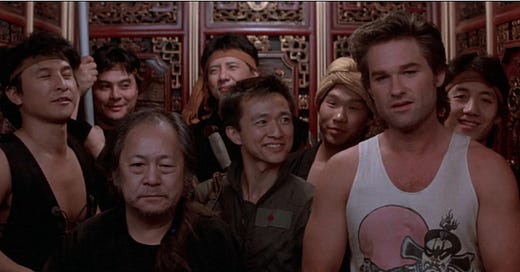



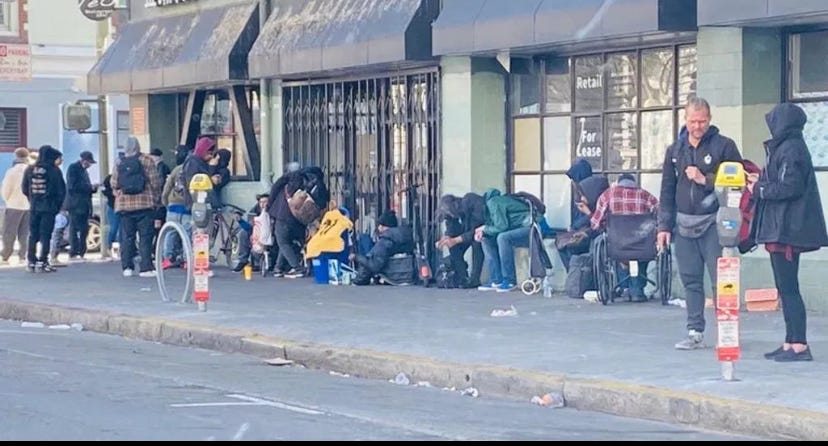
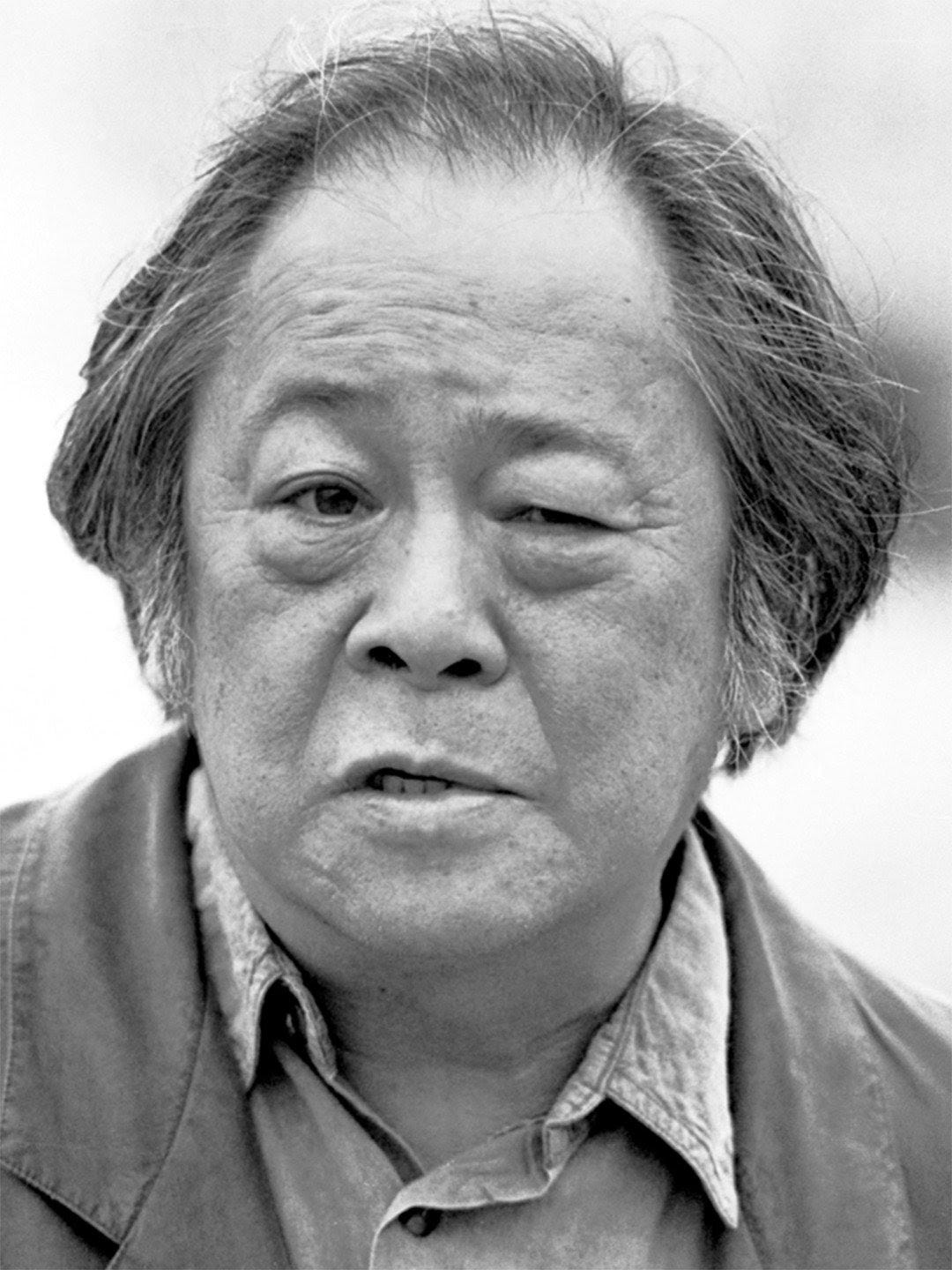

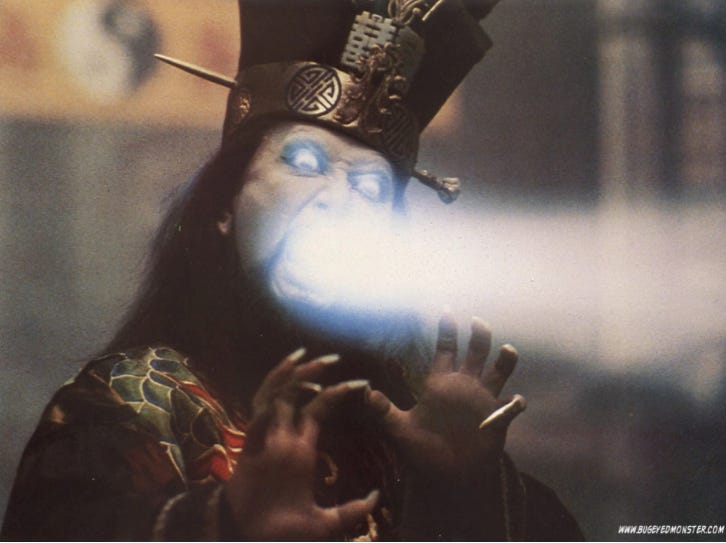
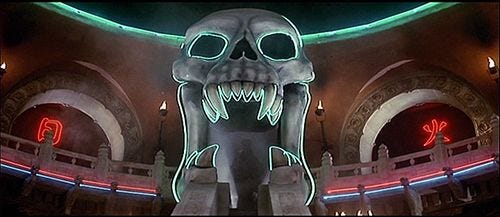
Loved this article, it is honestly almost as hilarious and entertaining as the actual film. I love this movie and watch it when sick (it is a comfort film for me).
Though that said, I like that it combines mysticism with western. I also like that Burton thinks himself the hero, but I think he does shine as one hero; the sort who would risk his life for another without any hesitation.
The truth is that the ethos of brotherhood that cuts across two such different cultures as the 'Anglo' one of America and the Chinese culture to which Wang belongs to, is the heart of the movie. As Burton and Wang show themselves to be total opposites in where they come from save in that they climbed up from nothing and both are successful, and defiant of the Globalistic, corporate force as represented by Lo Pan.
In my view Lo Pan represents rot in society, whereas the working-class men are meant to represent the stable force of the lower classes who are supposed to check the excesses of the upper-classes and whom are the true forces that compose society.
Another great essay. My restack mentions the slow death of high proles in the UK. It used to be the case that 3 to 4 pm was the best time to drink in most pubs. It was the time when semi-retired and self-employed blue collar entrepreneurs would come out to play. Most could have easily had a sideline in stand-up. The overproduction of elites comes at the expense of blue collar entrepreneurs. Mass migration slashes labour rates. One can still find rare pubs where this is still true, but both the pubs and the men are a dying breed.
Big Trouble in Little China is one of my favourite movies.